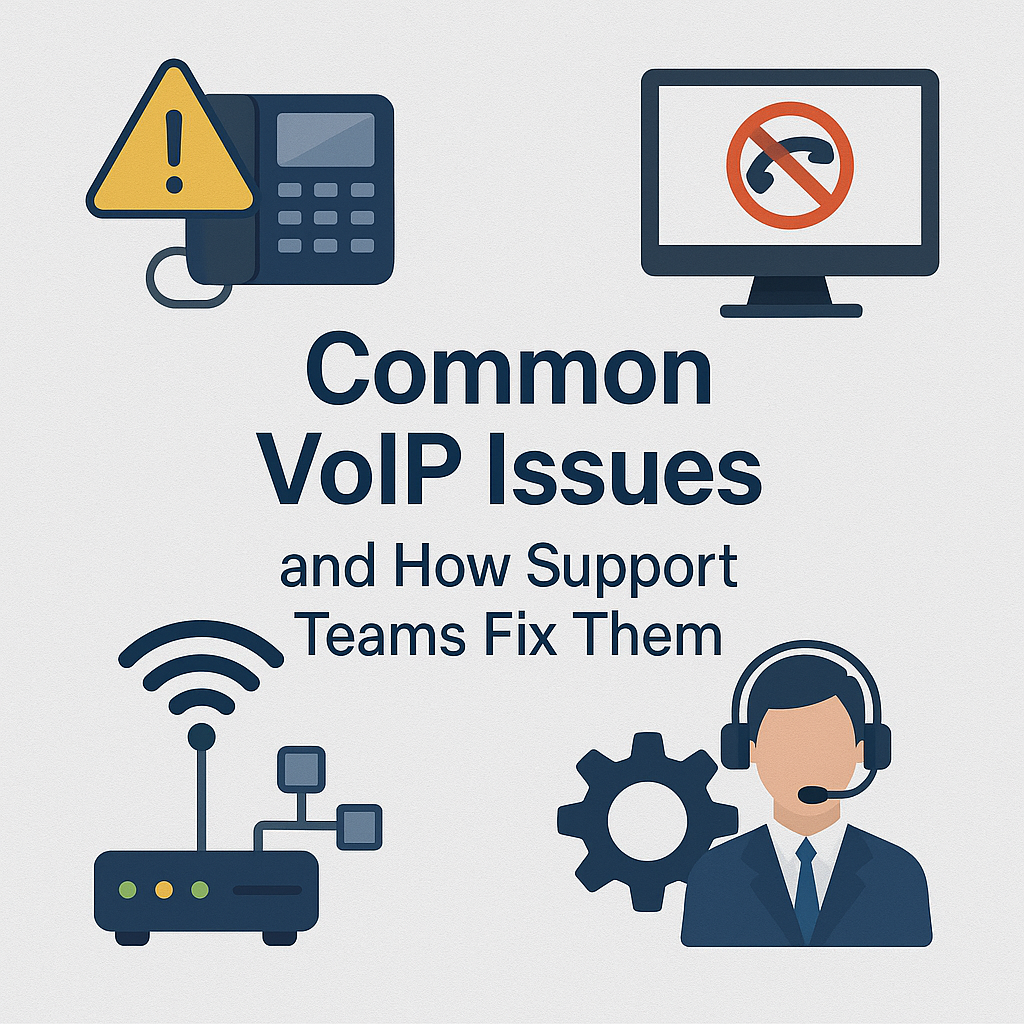How VoIP Support Enhances Remote Work Efficiency

Remote work has transitioned from being a temporary solution to becoming the standard for businesses worldwide. To meet the demands of this new normal, companies are leveraging technologies like VoIP support, which provides seamless communication, enhanced collaboration, and cost-efficiency. Supported by IT support for VoIP and implemented through advanced business VoIP systems, organizations can optimize operations while maintaining flexibility. Partnering with business telephone providers ensures companies have access to reliable, scalable, and secure VoIP solutions tailored to their unique needs.
In this detailed guide, we’ll explore how VoIP support revolutionizes remote work efficiency, helping businesses succeed in an increasingly distributed work environment.
What is VoIP Support?
Voice over Internet Protocol (VoIP) is a technology that allows voice and multimedia communication over the internet instead of traditional phone lines. VoIP support includes technical services provided to maintain and optimize these systems, ensuring their functionality for businesses.
Core Features of VoIP Support:
- System Configuration: Setting up hardware and software for optimal performance.
- Ongoing Maintenance: Regular updates to ensure compatibility with new technologies.
- Technical Troubleshooting: Addressing connectivity issues, latency problems, and call quality concerns.
- Customization Options: Tailoring VoIP systems to meet specific business requirements.
VoIP technology has evolved to include more than just voice calls. With features like video conferencing, real-time messaging, and advanced call routing, business VoIP systems have become integral to efficient communication in remote work setups.
Why Businesses Need IT Support for VoIP
Implementing and managing VoIP systems requires expertise, which is where IT support for VoIP becomes indispensable. IT teams handle the technical aspects, ensuring that VoIP solutions integrate seamlessly with existing systems and perform reliably.
Key Benefits of IT Support for VoIP:
- Seamless Integration: IT experts ensure that VoIP systems work harmoniously with CRM tools, email platforms, and project management software.
- Proactive Monitoring: Constantly tracking system performance to identify and resolve potential issues.
- Data Security: Implementing encryption protocols and firewalls to protect sensitive communications.
- Training and Onboarding: Helping employees learn how to use VoIP tools effectively, minimizing downtime.
With expert IT support, businesses can focus on their core operations while leaving the technical intricacies to professionals.
How VoIP Support Improves Communication
Effective communication is critical for remote work, where physical interactions are replaced by digital channels. VoIP support ensures that communication tools are always accessible and reliable.
Enhanced Communication Features of VoIP:
- Crystal-Clear Audio: High-definition voice calls that eliminate misunderstandings due to poor quality.
- Video Conferencing: Enables face-to-face meetings regardless of team members’ locations.
- Integrated Messaging: Combines chat, voice, and video into one cohesive platform for real-time interaction.
- Call Analytics: Provides insights into call performance, employee activity, and customer interactions.
With the help of business telephone providers, companies can access advanced VoIP systems that streamline communication, even across global teams.
Business VoIP Systems and Scalability
Scalability is a vital consideration for businesses as they grow or adapt to changing circumstances. Traditional phone systems often require significant investment to expand, whereas business VoIP systems are inherently flexible.
How VoIP Facilitates Scalability:
- Cloud-Based Architecture: Easily add or remove users without the need for additional hardware.
- Global Coverage: Seamlessly connect teams across different countries and time zones.
- Flexible Subscription Plans: Scale services up or down based on seasonal demands or organizational changes.
By collaborating with business telephone providers, companies can deploy VoIP solutions that align with their growth strategies, avoiding unnecessary expenses.
Cost Savings with Business VoIP Systems
The cost-saving potential of business VoIP systems is one of their most compelling advantages. Organizations can reduce overhead while gaining access to advanced features.
Financial Benefits of VoIP Systems:
- Reduced Call Costs: Internet-based calling eliminates traditional long-distance and international fees.
- Lower Infrastructure Investment: No need for extensive hardware; VoIP works on existing devices like laptops and smartphones.
- Energy Efficiency: Cloud-hosted VoIP systems require less power, lowering energy bills.
- Pay-As-You-Go Models: Businesses only pay for the features they need, optimizing budgets.
For small and medium-sized enterprises, VoIP systems present an opportunity to access enterprise-grade communication tools at an affordable price.
Flexibility is a cornerstone of remote work, and VoIP systems are designed to empower employees to stay connected from any location.
Ways VoIP Enables Flexibility:
- Mobile Compatibility: Employees can use VoIP on smartphones, ensuring they remain reachable outside traditional office settings.
- Cross-Device Synchronization: Calls, messages, and meeting histories are accessible across all connected devices.
- Virtual Office Environment: VoIP creates a unified workspace, supporting a “work-from-anywhere” culture.
Companies working with business telephone providers benefit from solutions that adapt to their team’s unique workflows, fostering higher productivity and job satisfaction.
IT Support VoIP Troubleshooting
No technology is immune to occasional issues, and VoIP systems are no exception. IT support for VoIP ensures that problems are resolved quickly to maintain uninterrupted service.
Common Issues Handled by IT Support:
- Call Dropping: Resolving network or hardware issues that cause interruptions during calls.
- Latency and Jitter: Optimizing bandwidth and quality of service (QoS) settings.
- Integration Challenges: Ensuring compatibility between VoIP systems and third-party software.
- User Errors: Providing training and support for employees struggling with new features.
A proactive IT team can prevent minor inconveniences from becoming significant roadblocks.
VoIP Security Features for Businesses
Security is a critical concern for remote work environments, where sensitive data is often transmitted over the internet. VoIP systems address this with robust security measures.
Top Security Features in VoIP Systems:
- End-to-End Encryption: Safeguards voice and video calls from interception.
- Secure User Authentication: Multi-factor authentication prevents unauthorized access.
- Firewall Integration: Blocks suspicious traffic and protects against hacking attempts.
- Regular Software Updates: Keeps the system ahead of evolving security threats.
Working with reputable business telephone providers ensures that security is prioritized, giving businesses peace of mind.
Integration of VoIP with Existing Systems
One of the strengths of VoIP technology is its ability to integrate seamlessly with other business tools, creating a unified digital ecosystem.
Popular Integrations for VoIP:
- CRM Platforms: Automatically logs call data, enhancing customer relationship management.
- Project Management Tools: Links communication with task assignments and progress tracking.
- Email and Calendar Syncing: Simplifies scheduling and coordination for remote teams.
Such integrations enhance productivity, allowing employees to focus on meaningful work rather than administrative tasks.
Future Trends in Business VoIP Systems
The future of VoIP technology is brimming with possibilities, driven by advancements in artificial intelligence, 5G networks, and immersive communication tools.
Emerging Trends:
- AI-Powered Assistants: Automate call routing, generate transcripts, and analyze conversations.
- 5G Connectivity: Boosts VoIP performance with faster speeds and reduced latency.
- Virtual Reality Collaboration: Merging VoIP with VR to create immersive virtual workspaces.
- Unified Communications as a Service (UCaaS): Expanding VoIP’s capabilities to encompass all digital communication.
As these trends unfold, businesses that invest in VoIP today will be well-positioned to adapt and thrive.
FAQs
1. What is VoIP support, and how does it benefit businesses?
VoIP support includes technical assistance for maintaining and optimizing VoIP systems, ensuring smooth and reliable communication. It benefits businesses by reducing costs, improving scalability, and enhancing productivity.
2. How do business telephone providers enhance VoIP systems?
They offer tailored VoIP solutions, advanced features, and 24/7 support to ensure the system meets specific business needs.
3. Are business VoIP systems secure for remote work?
Yes, modern VoIP systems come equipped with encryption, authentication protocols, and regular updates to ensure secure communication.
4. What role does IT support play in VoIP deployment?
IT support handles configuration, troubleshooting, and ongoing maintenance, ensuring VoIP systems perform optimally and remain secure.
5. Can small businesses afford VoIP systems?
Absolutely. Business VoIP systems are highly cost-effective, with flexible pricing models that suit small and medium enterprises.
6. What is the future of VoIP technology?
The future includes AI integration, 5G connectivity, and immersive communication tools like VR-enabled meetings, further enhancing VoIP’s capabilities.




No comment